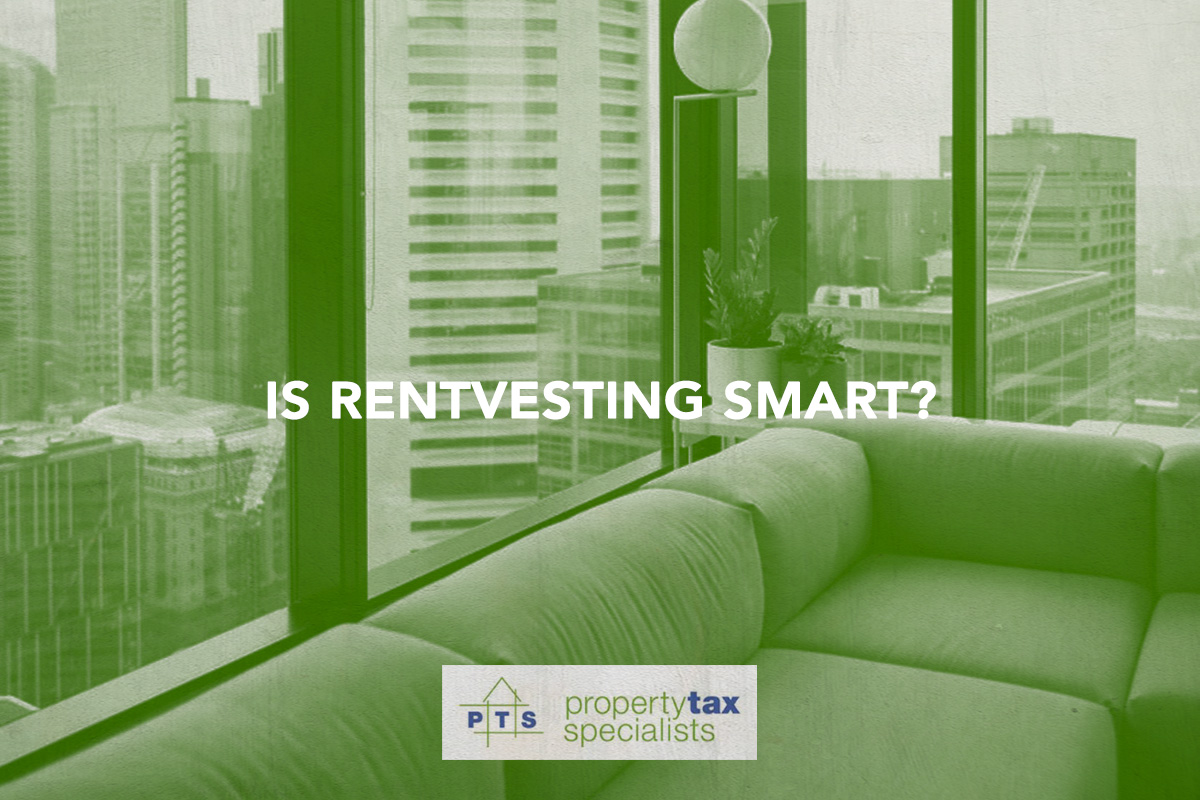Is Rentvesting Smart?
As property prices continue to soar in Australia’s major cities, many aspiring homeowners and investors seek alternative strategies to enter and climb the property ladder.
One approach that has gained significant traction in recent years is “rentvesting.”
But is rentvesting a smart move for you?
In this in-depth guide, we’ll explore how rentvesting works, weigh the pros and cons and delve into the tax implications and benefits of this unique investment strategy.
What is Rentvesting?
Rentvesting is an innovative investment strategy where an individual rents a property in a desirable location while purchasing investment properties in a more affordable area. This approach allows ‘rentvestors’ to enjoy the lifestyle benefits of living in a prime location while building wealth through property investment.
According to the Australian Bureau of Statistics (ABS), approximately 340,000 Australians were rentvestors in 2021, accounting for 15% of all property investors.
Experts have noted that rentvesting can be an effective way for first-time buyers to enter the property market sooner, especially in cities with high property prices like Sydney and Melbourne.
Take Sarah, a young professional living in Sydney who chose to rent an apartment in the city’s trendy inner suburb of Surry Hills for $600 per week while purchasing an investment property in the regional area of Ballarat, Victoria.
She bought a three-bedroom house for $400,000 with a 20% down payment of $80,000. With strong rental demand in the area, Sarah was able to secure tenants for her investment property at a weekly rent of $350, generating a rental income of $18,200 per year.
Over a period of two years, Sarah’s investment property in Ballarat experienced capital growth of 10%, increasing the property value to $440,000. Meanwhile, she enjoyed the vibrant lifestyle and amenities offered by Surry Hills without being weighed down by large mortgage repayments for a property in Sydney’s expensive housing market.
Sarah’s rentvesting strategy allowed her to build equity in her investment property while maintaining her desired lifestyle in a prime location.
So, rentvesting offers a flexible and strategic approach to property investment, allowing you to potentially balance your desired lifestyle with financial growth.
But how do you know if buying an investment property for rentvesting is the right property ownership move for you?

Weighing the Pros and Cons of Rentvesting
Like any investment strategy, rentvesting comes with its own set of advantages and disadvantages. To better understand the viability of rentvesting, let’s explore the pros and cons of this approach.
Pros:
- Lifestyle flexibility: Rentvesting allows individuals to live in their preferred location without committing to a high mortgage. A 2023 CoreLogic report found that the median house price in Sydney is $1,014,393, while the median price in regional areas across Australia is around $578,486.
- Diversification: Rentvesting enables investors to diversify their property portfolios by purchasing in different locations and property types, which can help spread risk and potentially enhance investment returns over time.
- Potential for capital growth and rental income: As Sarah’s case study demonstrated, rentvesting can lead to both capital growth and strong rental revenue. A property with strong rental demand can give investors a steady cash flow and long-term capital appreciation.
- Tax deduction opportunities: Since rentvestors generate income through renting their investment property, they can benefit from various tax deductions, including mortgage interest, property management fees, and maintenance costs. These deductions are generally unavailable to owner-occupiers.
You may be interested in reading about the 11 investment property tax deductions you can claim
Cons:
- Lack of stability: Rentvestors may face the uncertainty of renting, such as lease renewals and potential rent increases. According to Domain’s latest rental report, renters across Australia have experienced at least a 14% rise in rents over the past year.
- Increased expenses: Rentvesting may result in higher overall expenses, as investors need to cover both rent and property-related expenses (e.g., mortgage repayments, insurance, maintenance) for their investment property.
In addition to these pros and cons, you need to consider factors like market conditions, personal financial circumstances, and long-term goals when deciding if rentvesting is your strategy.

What are the Tax Implications of Owning an Investment Property?
Understanding the tax implications of rentvesting is crucial for investors looking to maximise their returns and minimise their tax liabilities.
Here’s an overview of the tax implications associated with rentvesting:
- Rental income: Rentvestors must declare rental income from their investment property as part of their assessable income. However, you can offset this by claiming various tax deductions.
- Tax deductible expenses: As previously mentioned, rentvestors can claim various tax deductions for their investment properties, including interest on mortgage repayments, property management fees, insurance, repairs and maintenance, and depreciation.
According to the Australian Taxation Office (ATO), property investors claimed over $47 billion in deductions in the 2018-2019 financial year, with the average claim being $22,058.
- Capital Gains Tax (CGT): When selling a rental property, rentvestors will have to pay Capital Gains Tax on any profit they make. However, the 50% CGT discount is available for properties you have held for over 12 months, effectively reducing the taxable capital gain by half.
- Negative gearing: If the expenses of the investment property exceed the rental income, rentvestors can offset this loss against their other taxable income, potentially reducing their overall tax liability. This practice is known as negative gearing.
Example
Tom, a rentvestor in Melbourne, rents an apartment in the city centre while owning an investment property in Geelong.
He earns $420 of rent money a week from his investment property, amounting to $21,840 annually. However, his annual property-related expenses, including mortgage interest, management fees, and maintenance costs, total $24,000.
As a result, Tom’s property is negatively geared, with a loss of $2,160 ($24,000 – $21,840). He can claim this loss as a tax deduction against his other taxable income, reducing his overall tax liability.
So, Is Rentvesting Worth It?
Whether rentvesting is best depends on individual financial circumstances, lifestyle preferences, and long-term investment goals.
Here are some questions you should ask yourself when evaluating if rentvesting is the right strategy for you:
How Do the Current Property Market Conditions in My Desired Area Impact My Decision to Rentvest?
Rentvesting can be a smart choice in markets with high property prices and strong rental demand, as seen in major Australian cities like Sydney and Melbourne. If you find it challenging to enter the property market in your desired location due to high prices, rentvesting could be a viable alternative.
What are my Lifestyle and Location Preferences, and Can Rentvesting Help Me Achieve Them?
If you want to live in a desirable location without the financial burden of purchasing a property in that area, rentvesting can provide the flexibility you need. Investing in property elsewhere while renting in your preferred location will allow you to live your desired lifestyle while building wealth.
What are my Financial Objectives, and Can Rentvesting Help Me Meet Them?
If your financial goals include capital growth, rental income, and tax benefits, rentvesting can be an effective strategy. For example, if you invest in a negatively geared property, you may be able to claim a tax deduction for the loss against your other taxable income, potentially reducing your overall tax liability.
How Comfortable Am I with Taking Risks With a Property Investment
Rentvesting can be a wise choice if you’re looking to diversify your property portfolio and spread risk across different locations and property types. By investing in multiple properties, you can potentially reduce the impact of market fluctuations on your investments.
Rentvesting can also help individuals seeking lifestyle flexibility, diversification, and potential financial gains. However, it’s essential to carefully consider the pros and cons, as well as your personal circumstances and long-term objectives.
Consulting with property investment and tax experts, like Property Tax Specialist, can provide valuable insights and guidance to help determine if rentvesting is the right choice for your unique situation.
Key Takeaways
Rentvesting offers an innovative approach to property investment that can potentially unlock lifestyle benefits, financial growth, and tax advantages.
To ensure you make the most informed decision, take the time to evaluate your personal circumstances, preferences, and long-term goals.
Remember, the key to successful rentvesting lies in careful consideration, strategic planning, and seeking professional guidance.
Don’t hesitate to contact the experienced team at Property Tax Specialist, who can provide personalised insights and advice tailored to your unique situation.
DISCLAIMER: This information has been prepared without taking into account your objectives, financial situation, or needs. Because of this, you should, before acting on this information, consider its appropriateness, having regard to your objectives, financial situation, or needs.
Amir Ishak is a Limited Authorised Representative 1269908 of Merit Wealth Pty Ltd, Australian Financial Services Licence 409361, ABN 89 125 557 002



